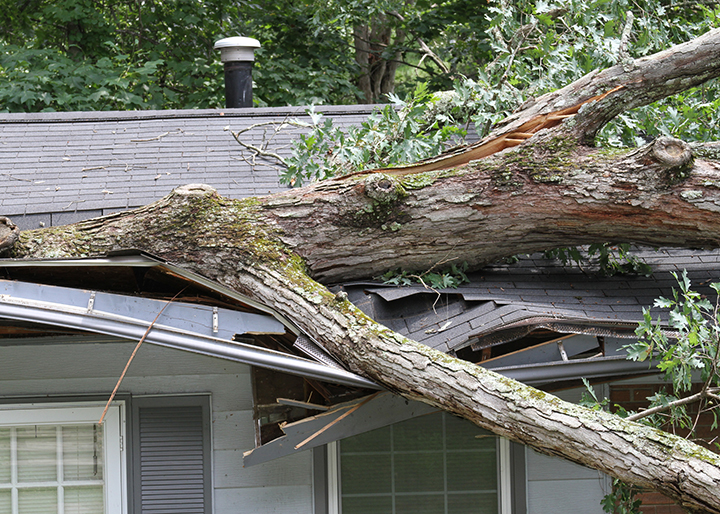Navigating the Evolving Insurance Landscape

A Guide for Real Estate Investors in 2024
By Jason Jones
Property owners across the country are grappling with the aftermath of another intense year for the insurance market. Extreme weather events and large-scale natural disasters have caused the insurance landscape to evolve significantly over the last few years. But what does that mean for real estate investors? Let’s start with a look back at a few of 2023’s most impactful losses.
Recap of 2023 Events
From January through March, a staggering 466 tornadoes were reported, mainly affecting Southeastern states like Mississippi, Louisiana, Arkansas, and Alabama. The trend of severe weather continued in the spring, with more tornadoes, hailstorms, heavy rain, and high winds, collectively contributing to approximately $25 billion in damages.
In late summer, wildfires on the island of Maui tragically claimed the lives of over 100 individuals and losses were an estimated $5.5 billion.
Shortly after, Category 4 Hurricane Idalia made landfall in the Southeast, triggering severe flooding and losses totaling $2.5 billion.
Insurance Market Response
In 2023, real estate investors faced significant price hikes with general rate increases and insurance to value (ITV) minimum increases. Rising building and material costs continued to be a major concern for insurance companies, mainly driven by large-scale natural disasters like wildfires, which impact material availability and the supply chain.
Beginning in 2022, many insurance companies continued to pull out of areas such as Florida, Louisiana, and California. Unfortunately, some were forced to shut down operations altogether, not only because it was no longer profitable but because there was concern that one extreme weather event could cause irreparable financial harm to all parties involved. Other companies identified risks they are no longer willing to insure. For example, many carriers now limit or exclude coverage for more frequent and predictable risks, such as Aluminum or Knob & Tube Wiring — two electrical systems that are serious fire hazards. In addition to more exclusionary language, these methods also resulted in higher deductibles.
The good news? The market is beginning to stabilize. The dramatic changes experienced in 2023 were insurance carriers establishing acceptable rates, deductibles, and coverages for viable businesses moving forward. Although costs are expected to continue rising, the rate at which they do is predicted to slow in the coming year. However, significant weather events will always affect the landscape of the insurance market.
Takeaways For Real Estate Investors
Consult Your Insurance Provider
Engaging in open discussions with your agent or broker is the best way to identify exposure, address concerns, and explore additional insurance products. Don’t hesitate to reach out if you have questions or need advice.
Choose Appropriate Coverage
As an investor, you must realize that protecting your property and your financial well-being are one and the same. Choosing the appropriate insurance agent/agency, policy coverage, ancillary products, and even coverage amounts can help save you money in the event of a loss.
Evaluate Coverage Amounts
Your insurance expenses don’t indicate how “good” the coverage is. Some high-end properties aren’t required to be insured at market value. They could be insured effectively at the rebuild value, an amount that is significantly less. Consider the following for each property you own to guide coverage decisions:
» How much could you afford to pay out of pocket if there were a loss?
» Are there other structures on the property and are they insured?
» After a large loss, would you make repairs to the home or clear the lot and sell the land?
» Is the property in an area prone to certain types of losses?
Prioritize Maintenance
Many people think purchasing adequate insurance policies creates a failproof risk management strategy. But the truth is, insurance can’t and won’t cover every exposure you have. While you can’t stop a hurricane from damaging your property, quite a few of the most common losses are preventable, such as cooking fires, tree damage, and burst pipes. Regular property inspections and maintenance are crucial in identifying risks and can significantly reduce the likelihood that you experience a severe loss. So, what should you include in your risk management plan?
Winter
Plumbing // Drain, disconnect, and store garden hoses. Install faucet covers to help prevent outdoor faucets and connected plumbing from freezing. Drain sprinkler systems and swimming pool pumps. Turn off the water and fully drain plumbing systems at all vacant properties.
Walkways // The expansion/contraction caused by freezing/thawing can lead to significant damage to exterior walkways, driveways, and stairs. Repair cracked, broken, or uneven areas.
Holiday Cooking // Cooking is the leading cause of house fires. Remind tenants to exercise caution in the kitchen and provide tenants with kitchen safety information upon move-in.
Spring
Roof & Gutters // Check roofs for damage — replace cracked, buckled, or loose shingles. Clean gutters and downspouts to debris from accumulating. Be sure downspouts drain away from the foundation.
Trees // Trim healthy trees and bushes back from utility wires. Hire a licensed and insured professional to trim dead branches and cut down large trees.
HVAC // Have a professional inspect air-conditioning systems and clean ducts. Check hoses for leaks and make sure everything is draining properly.
Summer
Decks // Replace broken or weak boards and handrails/grab bars. Sharp edges, splintered or rotting wood, rusted nails, or nail pops are liability hazards and must be remediated.
Pools // Ensure swimming pools and spas are up to current municipal standards. Pools should have a fence around the perimeter with self-closing and self-latching gates, anti-entrapment drain covers, and water depths clearly marked on all sides of the pool deck.
Fall
Alarm Testing // Carbon monoxide and smoke detectors should be installed on each floor in bedrooms, main hallways, and kitchens. Units should be tested monthly and replaced every ten years.
Heating // Tune-up furnaces and inspect HVAC systems. Have ducts professionally cleaned to prevent fires that may result from dust buildup.
Pests // Seal or caulk cracks, gaps, or holes near baseboards, windows, and doors to prevent bugs and rodents from entering the property. Cable, plumbing, and electrical service entry points should have a tight seal.
Wrapping Up 2023
After reflecting on another challenging year in the insurance industry, one thing is clear: the only constant is change. Protecting your real estate investments requires adaptability, foresight, and a trustworthy insurance partner to help you navigate ever-evolving market dynamics.














